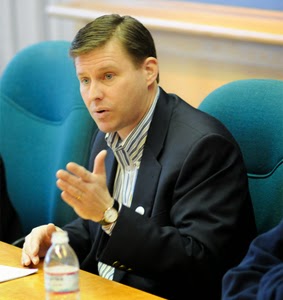- Public Policy
- Leadership
- Funding
- News & Events
- About the Center
Back to Top Nav
Back to Top Nav
Back to Top Nav
Back to Top Nav

Professor Charlie Wheelan '88, a Senior Lecturer in Economics, came to RLF this week, and his session highlighted the very pervasive problems that exist in policymaking and political leadership. Previously a correspondent for The Economist, a professor at the University of Chicago’s Harris School of Public Policy, a candidate for Illinois’ 5th congressional district and a student at Dartmouth, Professor Wheelan is incredibly well-versed in the understanding of how people process policies and political messages.
After showing the group one of his many interesting campaign videos, Professor Wheelan discussed the gap between the intellectual understanding of policies and the public perception of the same policies. Studies have shown that the two parties have nearly polar views of major policies, which is largely due to the poor communication strategies of academic “wonks” and the misleading rhetoric of political “hacks.” Giving the example of the carbon tax, Professor Wheelan showed how personal trade-offs are always perceived negatively by the public regardless of societal gains and long-term benefits for future generations. However, logically, the issue should be one-sided as people are not really rational economic actors.
Professor Wheelan also brought up the importance of powerful imagery and event-based shocks in generating beliefs, even if the core data behind the topic suggests something different. Finally, he showed the Fellows a Frontline video on word selection for political and corporate messaging, which involves heavy focus grouping and scientific measurements of stimulation and attention. To end the session, the Fellows were given the task of arguing either for or against the personal mandate and the carbon tax, giving us an opportunity to play with messaging and framing.